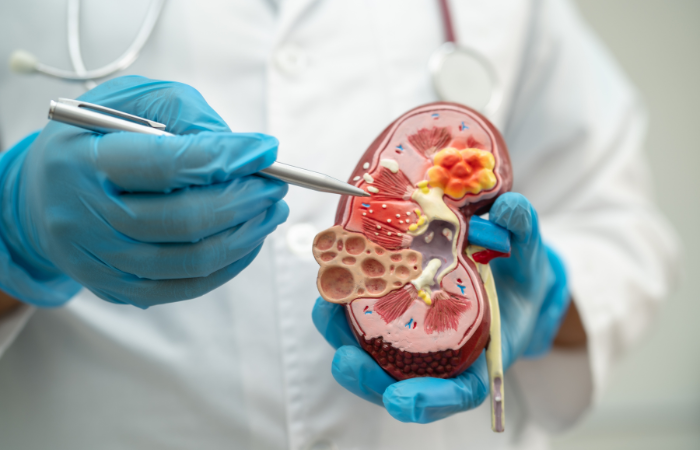
The kidneys play a vital role in filtering waste and excess fluids from the blood. However, conditions like diabetes and high blood pressure can significantly impact kidney function, leading to chronic kidney disease (CKD) or even kidney failure.
Diabetes is one of the leading causes of kidney disease worldwide. High blood sugar levels damage the tiny blood vessels in the kidneys, reducing their ability to filter waste effectively. This condition is called diabetic nephropathy and develops gradually over time. If left unchecked, it can progress to kidney failure, requiring dialysis or a kidney transplant.
1] High Blood Sugar Levels: Excess glucose in the blood makes the kidneys work harder, causing strain and damage over time.
2] Protein Leakage (Proteinuria): Damaged kidney filters start leaking proteins (like albumin) into the urine, a sign of kidney disease.
3] Inflammation and Scarring: Diabetes leads to inflammation in the kidneys, resulting in scarring (fibrosis), which reduces kidney function.
4] Increased Blood Pressure in the Kidneys: Diabetes can cause narrowing of kidney blood vessels, further reducing their efficiency.
A] Swelling in the legs, ankles, and feet
B] Frequent urination
C] Fatigue and weakness
D] High blood pressure
E] Shortness of breath
F] Nausea and loss of appetite
If you have diabetes, it’s essential to undergo regular kidney disease tests at a pathology lab centre near me to monitor kidney function.
High blood pressure (hypertension) is another major cause of kidney disease. The kidneys contain tiny blood vessels that help filter waste from the blood. When blood pressure is too high, these vessels can become damaged, leading to kidney dysfunction.
1] Increased Pressure on Blood Vessels: The excessive force of blood against vessel walls can cause them to narrow, weaken, or harden.
2] Reduced Blood Flow to Kidneys: Less blood flow means the kidneys receive fewer nutrients and oxygen, impairing their ability to filter waste.
3] Formation of Kidney Scars: Over time, damaged kidneys develop scars, leading to chronic kidney disease (CKD) or kidney failure.
4] Fluid and Waste Buildup: When kidneys cannot filter properly, waste accumulates in the blood, causing serious health complications.
A] Headaches and dizziness
B] Swelling in the face and legs
C] Shortness of breath
D] Blood in urine
E] Fatigue and difficulty concentrating
Regular monitoring of kidney health through pathology lab tests in Pune can help detect problems early and prevent further complications.

Early detection of kidney damage can prevent severe complications. If you have diabetes or high blood pressure, regular kidney disease tests are essential to monitor kidney function. You can visit the best blood test lab in Pune to get the following tests done:
1. Blood Tests :
A] Serum Creatinine Test: Measures creatinine levels in the blood to assess kidney function.
B] Blood Urea Nitrogen (BUN) Test: Evaluates waste removal efficiency.
C] Glomerular Filtration Rate (GFR): Determines how well the kidneys are filtering waste.
2. Urine Tests:
A] Urine Albumin Test: Detects protein leakage, an early sign of kidney damage.
B] Urinalysis: Checks for blood, protein, and other substances in the urine.
3. Imaging Tests :
A] Ultrasound or CT Scan: Helps visualize kidney size and detect abnormalities.
A pathology lab centre near me can provide these tests, helping you track your kidney health effectively.
Managing diabetes and high blood pressure is key to preventing kidney disease. Here are some essential tips:
1. Control Blood Sugar Levels :
A] Monitor glucose levels regularly.
B] Follow a diabetes-friendly diet.
C] Take medications as prescribed.
2. Maintain Healthy Blood Pressure :
A] Limit salt intake.
B] Exercise regularly.
C] Reduce stress and avoid smoking.
3. Stay Hydrated and Follow a Kidney-Friendly Diet :
A] Drink plenty of water.
B] Eat a balanced diet with low sodium, potassium, and phosphorus.
4. Regular Checkups and Kidney Tests :
A] Visit the best blood test lab in Pune for routine checkups.
B] Get tested regularly to monitor kidney health.